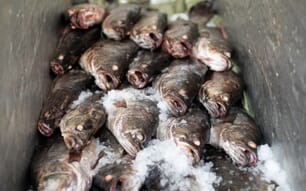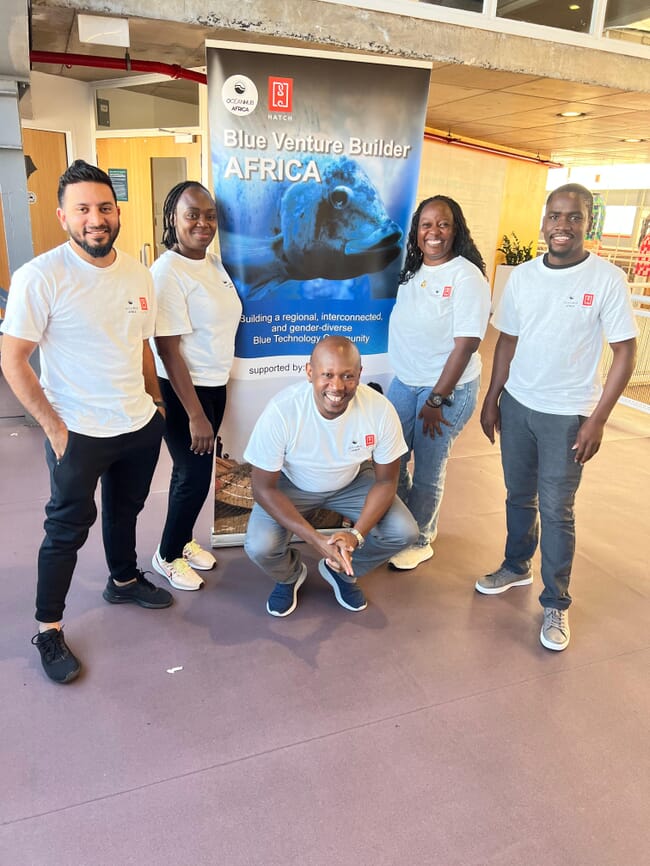
The programme is led by Hatch Blue and Ocean Hub Africa (OHA) with support from the Deutsche Gesellschaft für Internationale Zusammenarbeit (GIZ) © Wavu
Wavu was established this May during the Blue Venture Builder Africa by five entrepreneurs – Lorna Afwandi, Angela Odero, Don Okoth, Amaan Pirani and Vincent Oduor.
While each of Wavu’s founders initially applied to the programme with plans to build their own companies, it wasn’t long before the five decided to join forces and build a digital platform designed to connect farmers with key inputs.
"We each brought our own piece of the puzzle to the aquaculture sector, but we realised that the impact we wanted to create could only be achieved together. By uniting our expertise, we aim to address the gaps we’ve seen firsthand and drive sustainable change that reaches beyond individual success, transforming aquaculture," reflects co-founder and COO, Lorna Afwandi.
The result was Wavu, which means net in Swahili – a reflection of the network that the startup are aiming to build in Kenya’s fast-growing, but fragmented, aquaculture sector.
“Essentially what we are looking to do is link smallholder fish farmers to high quality and affordable inputs, while also guaranteeing their offtake market by aggregating the demand for their fish,” she adds.
And they quickly realised that – from a tech perspective – there was little need to reinvent the wheel.
“During our market validation journey we discovered that most farmers were using WhatsApp as a preferred means of communication, so we based the MVP [minimal viable product] off the WhatsApp platform, linked to AI. So then it’s easy for users to go on the platform, text what they need, and then we can see how to get it to them,” she adds.
While it may not be a groundbreaking concept, Afwandi is convinced that Wavu’s take on it will benefit farmers more than existing platforms in Kenya.
“In terms of e-commerce platforms, Kenya has quite a number, but I personally don't know any that is fully working or that offers a holistic approach the way Wavu is, as a one-stop platform. For most you can only use to sell your fish or buy feeds,” she explains.
Wavu can also draw on the depth of aquaculture experience offered by its team.
“A lot of farmers call in and maybe want to buy feeds, but they don't always know what is the right feed or what is the right quantity, but we are able to actually advise the farmers,” she adds.
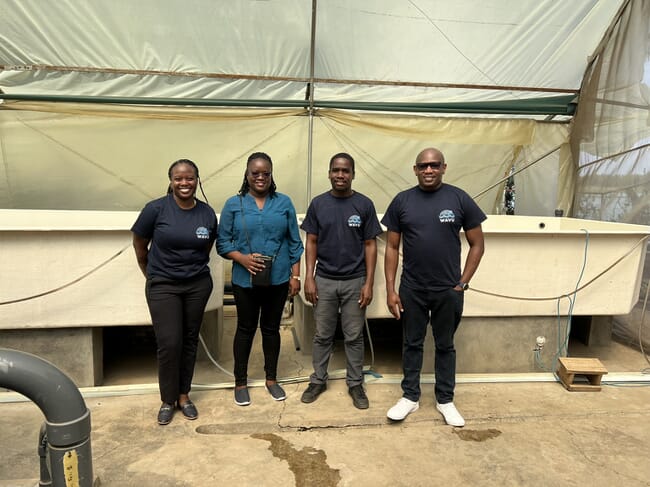
A strong team
Having as many as five founding members can bring both pros and cons, but Afwandi sees it in a positive light.
“A big advantage is that essentially everyone in our team knew the challenges in the aquaculture sector. That has helped to form a cohesive idea,” she observes.
Afwandi’s own understanding of the sector came through her governmental work with stakeholders in the industry, which highlighted farmers’ needs.
“I’ve spent eight years in sustainable aquaculture and project management. By interacting with the farmers you get to learn most of their challenges, but you cannot really address them. If a farmer has ordered monosex tilapia fingerlings, but gets mixed sex ones, this can be prevented but the farmers don’t always have the expertise or connections to know there are actually better options out there. That is what actually inspired me to get into the entrepreneurship journey so that I'm not sitting in the background, but being more proactive in the sector. As COO, my role in Wavu is to improve operational efficiency and ensure regulatory alignment,” she explains.
Meanwhile, each of the four others brings a valuable mixture of skills.
“Don, the CEO, years of experience in supply chain technology and logistics, having previously raised $20 million and led an African expansion drive. His leadership is pivotal in guiding Wavu’s strategic growth and expanding its impact in the region. Vincent, the CTO, specialised in hatchery and cage operations for seven years, with a focus on aquaculture design to drive technical innovation and productivity. Angela, the CFO, brings over 20 years of financial experience, including in cage farming and fish markets, ensuring robust financial management. Amaan, the CSO, leverages his decade of experience in infrastructure and project finance to build and scale essential aquaculture infrastructure,” Afwandi explains.
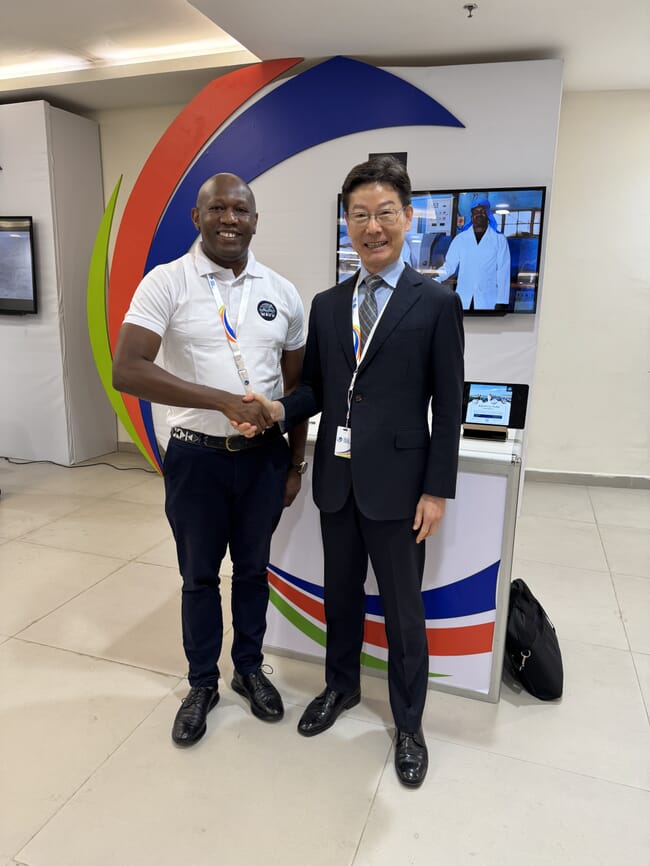
The story so far
According to Afwandi, Wavu have received 30 orders to date, generating around US $30,000 in revenue. These have mainly been for fresh fish, but also for feeds and various pieces of equipment – ranging from pond liners, to aerators, to a feed extruder. They are also able to link up clients with service providers, such as hatchery construction specialists.
“Clients can ask us for things even if they’re not be listed on the platform, and we should be able to source it for them,” she notes.
The concept is relatively simple, but – as success stories in other regions, like eFishery and Aquaconnect have shown – it has huge potential and clear demand.
It’s also a concept that doesn’t require vast investment to get started, although one clear exception is the need to establish the means to keep fish fresh. Having aggregated 15 tonnes so far, Wavu is now looking into leasing new cold chain facilities that would allow them to handle three tonnes of fish a week, and potentially increase this in line with demand.
“But essentially we are still trying to be very asset-light,” Afwandi reflects.
Milestones and challenges
Wavu is currently taking part in the E4I Incubator Programme and have also won the UNIDO Global Food Tech award, which will be presented in South Korea, as well as exhibited in the World Without Hunger conference in Ethiopia.
They have recently secured a workspace in Nairobi, where three of the team are based, while the other two are based in Kisumu, Kenya’s aquacultural capital.
However, they also have issues to iron out.
“The platform was working well and the tech integration was really easy, but we have to keep increasing our subscription costs to the servers. Tech integration is also becoming a bit of a challenge, especially expense-wise, and the other thing is fish aggregation. We are looking at partnering with a third party for solar refrigeration for our farmers, so the fish gets to us in a fresh state, as the cold chain infrastructure is really a challenge and we don't have a shop of our own,” notes Afwandi.
In terms of funding, Wavu has been bootstrapped so far, with the founders using their existing skills and companies to help them grow
“Don, for example, already had a tech company, which helped in terms of developing the MVP, while some of the team’s existing staff have actually helped us, so that we don't have to outsource human resources as well. When something needs to be bought, sometimes all the founders just chip in,” Afwandi explains.
They have also ploughed the company’s revenues back into the business, but will soon be looking to raise around $25,000 to improve their tech and enhance their clout with suppliers, enabling them to bulk buy feeds, for example, at a discount.
Plans to expand
Looking ahead, Wavu has plans to increase their offerings.
“A lot of farmers face challenges in regards to accessing finance to expand their ventures, unlike other agricultural players. There are also very few insurance companies working within the aquaculture value chain in Kenya, making it a risky venture. There’s also a need for education, as some farmers might not have a full grasp of the sector and there is need to keep building their capacity as well as introducing new technology. As a result, we aim to tie in platforms relating to leasing, finance, insurance and education, in order to make a fully integrated platform,” Afwandi observes.
They also aim to branch out into wider East Africa and Afwandi is also keen to explore how they can help to provide opportunities for vulnerable people.
“Being a women-led company, we want to see how we can best reduce exploitative practices in the market and how we can offer women high quality and affordable inputs and then guarantee their offtake market so that they're not just selling fish for the sake of selling fish – you need to get the next meal on the table,” she explains.
“We are looking to create employment and increase income generation in the sector and all the team members are looking forward to hiring more youths. We also want to explore how to mix the social enterprise aspect with the for-profit enterprise and see how to get affordable fish protein to the communities and reduce their costs in relation to consuming fish,” Afwandi adds.
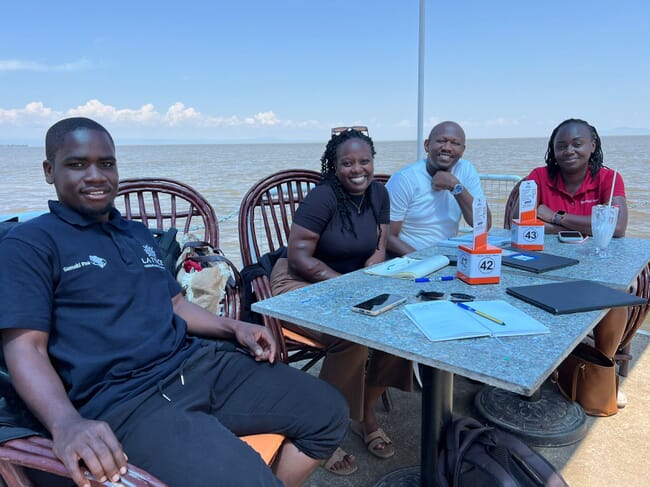
© Wavu
The state of Kenya’s aquaculture sector
Kenya’s aquaculture sector currently has around 37,000 farmers and no shortage of startups and investors emerging, according to Afwandi, suggesting there’s plenty of momentum behind it. However, some of the problems that have long plagued it are proving hard to overcome.
“I think it's doing well, but the number one challenge if you ask the farmers is sourcing fingerlings. Getting quality monosex tilapia is proving to be a real problem. There are not enough hatcheries to meet the demand for fingerlings. Even cage farmers who order fingerlings can be put on a waiting period of a month or two,” Afwandi explains.
“And then there's also the challenges of feeds. Although there are now businesses trying to produce feeds locally, they still have to import most of the raw materials. Traditionally , soya is not grown in Kenya. There are programmes currently implementing that, but they are still at inception stages,” she adds.
However, not all farmers face the same problems and Afwandi points out that larger scale operators have more bargaining power and greater access to inputs – with a growing number developing their own hatcheries and feed mills.
As a result – for now at least – small-scale farmers, especially those in remote areas, are likely to remain Wavu’s core customers. But if they can uplift these players there’s scope to not only grow their business, but also achieve their social goals too.



